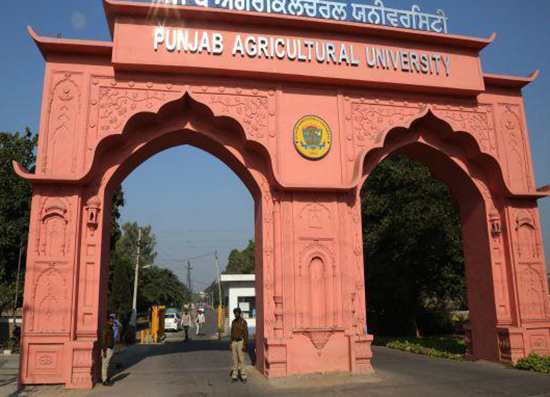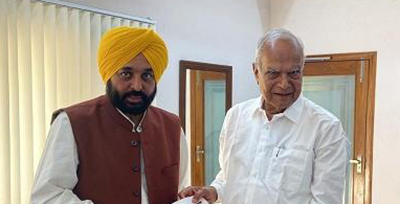Governor or Chief Minister of Punjab: Who is justified from Legal Perspective?
Controversy Regarding the Appointment of Vice Chancellor of the Punjab Agriculture University!
Basic Question: Whether PAU was set up under State Act or Central Act ?
Gurbani says 'ਵਿੱਦਿਆ ਵਿਚਾਰੀ ਤਾਂ ਪਰਉਪਕਾਰੀ' ( Contemplate and reflect upon knowledge, and you will become a benefactor to others, but these days the controversy regarding the appointment of the Vice Chancellor of the Punjab Agriculture University has created a very unfortunate and disheartening situation in the education sector. Both Governor and Chief Minister can be said to be equally responsible for it. When such important Constitutional position holders have advisors with little legal knowledge, it is natural for such a phenomenon to occur. Here, we will explore whether the Governor or the Chief Minister is right or wrong from the legal point of view regarding the appointment of Vice Chancellor of Punjab Agriculture University, Ludhiana.

In fact, the main reason for this controversy can be said to be lack of deep or accurate knowledge of different types of Universities in India and the legal provisions about them. Based on the process of University formation or incorporation in India, there are four types of universities. The first is 'Central University', established by an ‘Act’ or Law passed by the Parliament of India. The second is the 'State University', which is established by passing an 'Act' by the Legislature of a State. The third is a 'Deemed University', which is declared by the Central Government on the advice of the University Grants Commission. The fourth type of University is called 'Private University', which is established by an ‘Act’ passed by the State Legislature, but is promoted by a trust, company or society.
The primary reason for the ‘opinion’ made by the Governor of Punjab about the Vice Chancellor of Punjab Agriculture University is that he is considering this University as a 'State University'. The proof of this is that in the Press Conference held at Raj Bhavan, Chandigarh, regarding the appointment of the Vice Chancellor of Punjab Agricultural University and the Press Note issued, it was projected as 'State University' which is a completely wrong notion. It is true that when the Punjab Agricultural University was established in 1961, it was a 'State University,' as it was established by the Punjab Legislative Assembly, passing ‘the Punjab Agricultural University Act, 1961’ (Act No. 32 of 1961). Here, it is very important to know that what is today’s University i.e the Punjab Agricultural University, it was established in 1970 by the Parliament of India by passing ‘The Haryana and Punjab Agricultural University Act, 1970 (Act No: 16 of 1970)'. The fact is that after the formation of Haryana, the Legislative Assemblies of Punjab and Haryana passed resolutions as per Article 252 (1) of the Constitution of India, recommending the Government of India to establish two independent Universities in place of the initially established Punjab Agricultural University, due to which the Parliament of India by passing the ‘The Haryana and Punjab Agricultural University Act' in 1970, and it created the 'Haryana Agricultural University' for Haryana and the 'Punjab Agricultural University' for Punjab. Here, it is also important to know that the initially established Punjab Agriculture University was dissolved under Section 3 of this 1970 Act. According to Section 45 (1) of the Act of 1970, the 'Punjab Agriculture University Act, 1961' was also repealed.
It is clear from examining the above legal provisions that what Punjab Agriculture University Ludhiana is today, it is not a 'State University' but a 'Central University' created by the Central Act, and it is not legally correct to call or understand it as a 'State University'. What has been said by the Governor of Punjab about the 'powers and duties' of the Chancellor of the Universities established by the State Legislature or the State Government is correct, because according to the 'Act' of the various State Universities in Punjab, the powers and duties of the Chancellor are the same. But the position, powers and duties of the Governor of Punjab or Chancellor of the Punjab Agriculture University,, created by the ‘Central Act’ are entirely different because of the provisions of ‘the Haryana and Punjab Agricultural University Act, 1970 and having its own Act and Statutes. It is true that the Governor of Punjab has been made the Chancellor of the University under Section 12 (1) of the Act of 1970, but at the same time under Section 12 (2) the Chancellor is designated ‘the 'Head' of the University and due to his position, if he is present, he will preside over the Convocation of the University.' Another important fact is that according to Section 12(3), 'the Chancellor shall have such other powers as are specified in this Act or as may be prescribed'. So without specified or prescribed powers under the Act, he cannot assume or there cannot be any other power with him.

If we look at the Acts of the 'State Universities' established in Punjab, for example, the Guru Nanak Dev University Amritsar Act, 1969 or the Punjabi University Patiala Act, 1961, it is significant to note that in Section 9 of both these Acts, it is only written that, ‘ he Governor of Punjab will be the Chancellor of the University.' Therefore, like the Haryana and Punjab Agricultural University Act, 1970, no Act or prescribed powers limit has been imposed on him.
If the provisions of ‘the Haryana and Punjab Agricultural University Act, 1970’ is carefully read, examined, interpreted and understood, it becomes clear that the responsibility of all the work of the Punjab Agricultural University has been given to the 'University Board'. The Board is constituted as per Section 13 of the Act and the 'Powers and Duties' of the Board are enumerated in Section 14 of the Act. According to this section 14 (J), the Board approves the appointment of the Vice Chancellor of the University. The Vice-Chancellor is appointed as per Section 15 of the Act read with Statutes 2(2). Section 15 (1) clearly states that 'The Vice-Chancellor shall be a whole-time officer of the University and shall be appointed by the Board.' Another provision has been made here that if the members of the Board are not 'unanimous' about the appointment of the Vice Chancellor, then the Vice Chancellor will be appointed by the 'Chancellor'. Since no such situation has arisen regarding the appointment of the present Vice-Chancellor, the Governor has no legal basis to interfere in it.
Finally, when we look at the Press Note issued by the Governor, it is very disappointing to see, how the facts have been either unknowingly or deliberately twisted by the Governor's office. When it is written in the Press Note itself that according to Section 13(11) of the Act of 1970 the Governor is the 'Honorary Chairman' of the 'University Board' and the Vice-Chancellor is the 'Working Chairman', under which Section of the Act it is claimed that he, being the 'Chairman' (actually Honorary Chairman?) had to be informed by the Punjab Government about the entire process. He is not even a member of the Board. The Vice Chancellor chairs the meeting of the Board, as he is the senior most member of the Board. After him, the name of Chief Secretary of Punjab has been numbered, due to which he chairs the meeting in the absence of Vice Chancellor.
The University Grant Commission Regulations , 2018, which are mentioned in the Press Note, it must be noted that not only the Vice-Chancellor of the University, but also the appointment of teaching and other staff are mentioned in detail. That is why these are applicable to all types of Universities. But an important fact which is written in the Press Note at number 3, is necessarily readable. It is written here that ‘as per 7 of the Regulation there shall be a Search Cum Selection Committee for the selection of the post Vice-Chancellor: One member of the Search Committee shall be appointed by the Chairman of the UGC...’ Here the truth is hidden from the facts. The truth is that as per Regulation 7 (3) (ii) UGC Chairman will appoint a member only for the Selection Committee of Vice Chancellor of ‘State, Private and Deemed University’ and not of Central University, as the term Central University is not mentioned here. Punjab Agriculture University being Central University, therefore, what has been said about the nominee of the Chairman of UGC does not apply here.
What has been said in the next paragraph of the Press Note shows how efficient the legal experts in the Punjab Governor's office are. According to this paragraph, UGC Regulations are 'Subordinate Legislation', as per Article 254 of the Constitution of India, they 'shall supersede any Act made by the State.’ To prove their point, they have mentioned the case of Gambhisdan K. Gandhi Vs. State of Gujrat and Supreme Court decision of 11 October 2022, State of West Bengal vs. Anindya Sunder Das, according to which if there are conflicting provisions in the Central Law and the State Law, then according to Article 254 of the Constitution, the Central Law will prevail over the State Law due to the ‘Principle/Rule of Repugnancy.’ It is correct that when there is a conflict between the Central and State laws, the Central law will prevail. But the thing to be seen is whether these Rule of Repugnancy or court decisions are applicable regarding the appointment of Vice Chancellor of Punjab Agriculture University. As I have already mentioned that the Punjab Agricultural University is not a State University established by the State Law but is established by ‘the Haryana and Punjab Agricultural Universities Act, 1970' passed by the Parliament of India, therefore, the arguments based on above quoted decisions or Rule of Repugnancy by the Governor's office is absolutely incorrect and legally untenable. Since the Act of 1970 is a 'Central Act' which can be termed as a 'Special Law' and the University Grants Commission Act or Regulations mentioned as 'Subordinate Legislation' are also 'Central Act' which can be termed as ‘General Law’, therefore, there is no question of conflict between Central and Stat laws. While according to the legal proposition and Court decisions, 'Special law' prevails over 'General law'.
From examining all the above legal aspects, it is clear that the appointment of the Vice Chancellor of the Punjab Agriculture University made unanimously by the 'University Board', is legally valid and the Governor- Chancellor or the Chief Minister has no role in it.
In the beginning, I said that both parties are responsible for this controversy. Now, it can be clearly said that neither the Governor was clear about this University status of its being a ‘Central University’, nor was the Chief Minister clear in his reply as he did not mentioned the above said law provisions of 1970 Act, relating to the University.
This controversy should be and can be stopped only on proper knowledge, understanding and interpretation of the provisions relating to the Punjab Agriculture University enshrined in ‘the Haryana and Punjab Agricultural University Act, 1970’. This will be an important and praiseworthy contribution in the prosperity of Punjab and agricultural field of India.
October 27,2022
-.-.-.-
-

-
Dr. Daljit Singh, LL.M., Ph.D, Ex: Professor and Head, Department of Law, Guru Nanak Dev University Regional Campus, Jalandhar and Vice Chancellor, Rayat Bahra University, Mohali
vcdaljitsingh@gmail.com
Phone No. : +91-9814518877
Disclaimer : The opinions expressed within this article are the personal opinions of the writer/author. The facts and opinions appearing in the article do not reflect the views of Babushahi.com or Tirchhi Nazar Media. Babushahi.com or Tirchhi Nazar Media does not assume any responsibility or liability for the same.